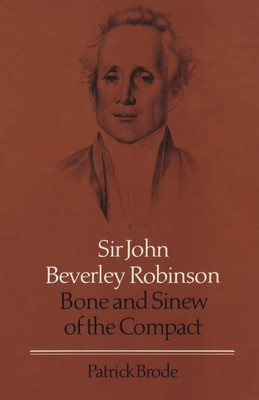
- We will send in 10–14 business days.
- Author: Patrick Brode
- Publisher: University of Toronto Press
- ISBN-10: 0802034195
- ISBN-13: 9780802034199
- Format: 15.2 x 22.9 x 2 cm, minkšti viršeliai
- Language: English
- SAVE -10% with code: EXTRA
Reviews
Description
John Beverley Robinson (1791-1863) was one of Upper Canada's foremost jurists, a dominating influence on the ruling élite, and a leading citizen of nineteenth-century Toronto who owned a vast tract of land on which Osgoode Hall now stands.
The loyalists had founded a colony firm in its devotion to the Crown, with little room for dissent. As a true loyalist son, educated by John Strachan, Robinson attempted to steer Upper Canada toward emulation of what he perceived to be Britain's ideal aristocratic society.
As a young ensign in the York militia, he defended his sovereign at Queenston Heights, and as acting attorney-general he prosecuted traitors who threatened to undermine the colony. Later, as attorney-general and de facto leader of the assembly during the 1820s, he tried to mould the government to the British form. But factors he never understood--the influence of American democracy and liberalism in the Colonial Office--ensured that Upper Canada would never be a 'new Albion.'
Robinson was appointed chief justice in 1829, and his judicial career spanned thirty-three years, during which he insisted the courts were subservient to the legislature and established precedents declaring their role should be limited to the enforcement of existing laws, with no independent creative function. His long service on the bench represented both a preservation and a strengthening of the British tradition in Canadian law.
In this biography, early Toronto comes alive through the eyes of a powerful man--firm in his beliefs, attractive to women, respected by his fellows--who sought to mould society to his own ideals. For historians, lawyers, and students of jurisprudence who seek an understanding of the roots of legal practice in nineteenth-century Ontario, it is essential reading.
EXTRA 10 % discount with code: EXTRA
The promotion ends in 23d.14:02:16
The discount code is valid when purchasing from 10 €. Discounts do not stack.
- Author: Patrick Brode
- Publisher: University of Toronto Press
- ISBN-10: 0802034195
- ISBN-13: 9780802034199
- Format: 15.2 x 22.9 x 2 cm, minkšti viršeliai
- Language: English English
John Beverley Robinson (1791-1863) was one of Upper Canada's foremost jurists, a dominating influence on the ruling élite, and a leading citizen of nineteenth-century Toronto who owned a vast tract of land on which Osgoode Hall now stands.
The loyalists had founded a colony firm in its devotion to the Crown, with little room for dissent. As a true loyalist son, educated by John Strachan, Robinson attempted to steer Upper Canada toward emulation of what he perceived to be Britain's ideal aristocratic society.
As a young ensign in the York militia, he defended his sovereign at Queenston Heights, and as acting attorney-general he prosecuted traitors who threatened to undermine the colony. Later, as attorney-general and de facto leader of the assembly during the 1820s, he tried to mould the government to the British form. But factors he never understood--the influence of American democracy and liberalism in the Colonial Office--ensured that Upper Canada would never be a 'new Albion.'
Robinson was appointed chief justice in 1829, and his judicial career spanned thirty-three years, during which he insisted the courts were subservient to the legislature and established precedents declaring their role should be limited to the enforcement of existing laws, with no independent creative function. His long service on the bench represented both a preservation and a strengthening of the British tradition in Canadian law.
In this biography, early Toronto comes alive through the eyes of a powerful man--firm in his beliefs, attractive to women, respected by his fellows--who sought to mould society to his own ideals. For historians, lawyers, and students of jurisprudence who seek an understanding of the roots of legal practice in nineteenth-century Ontario, it is essential reading.


Reviews